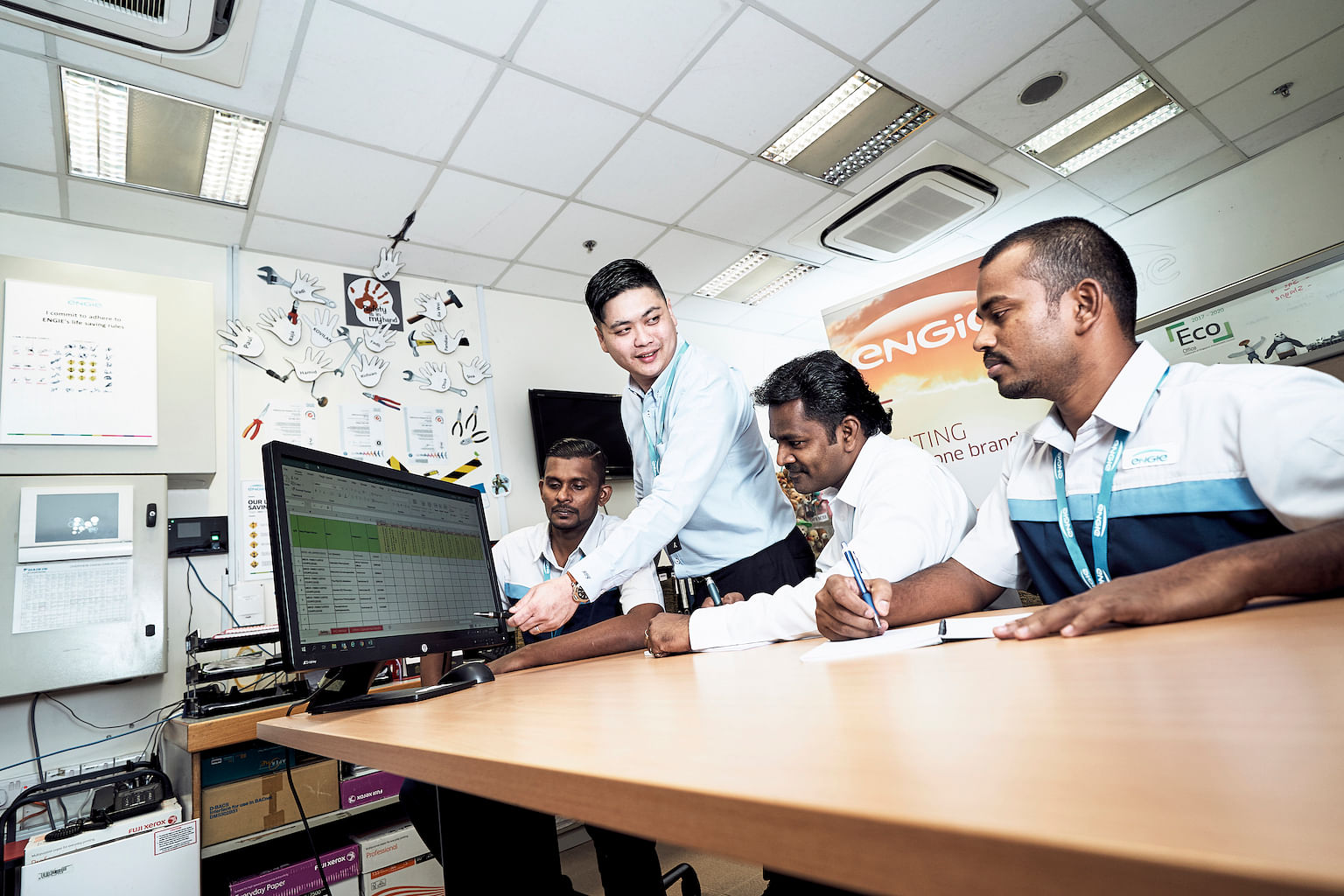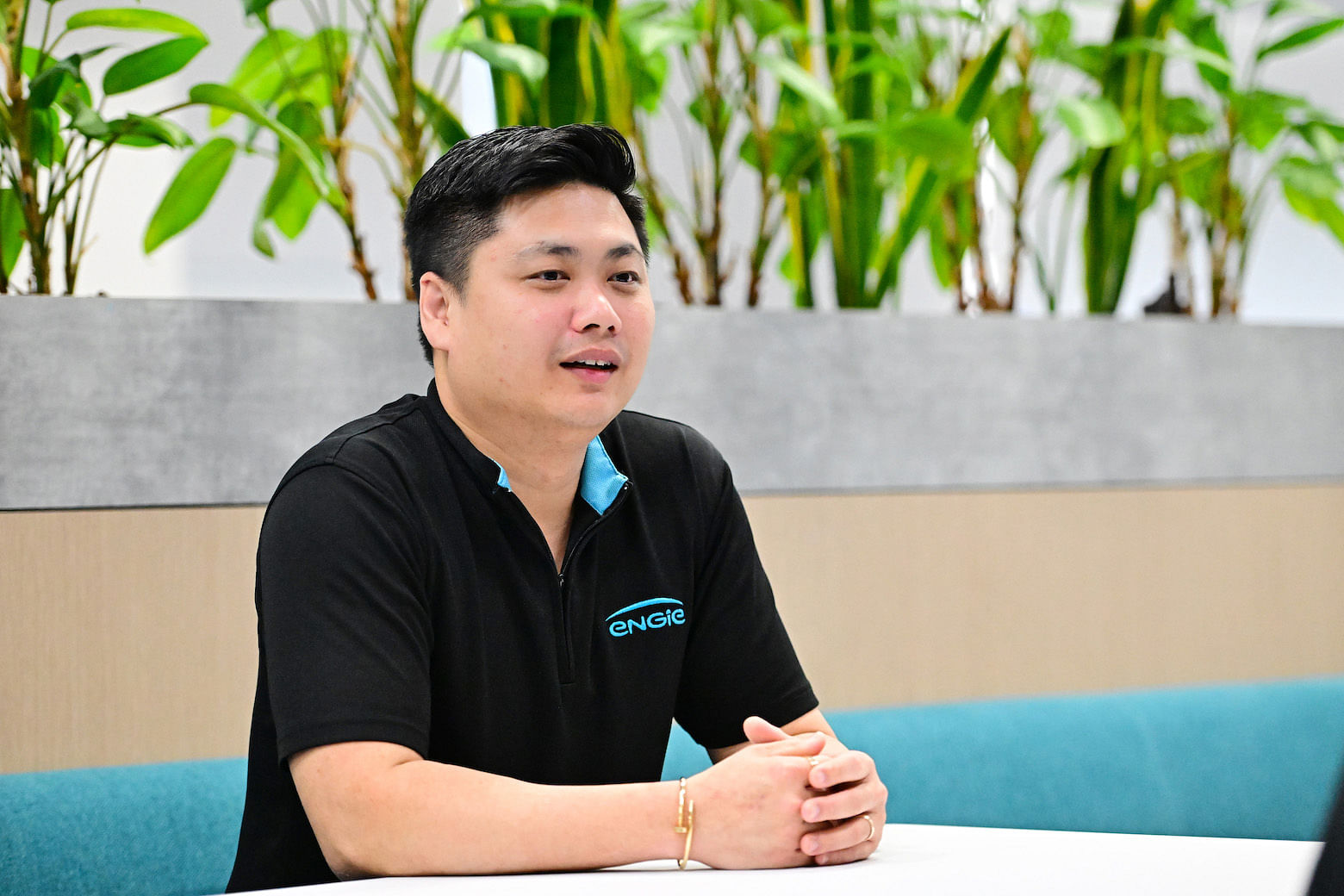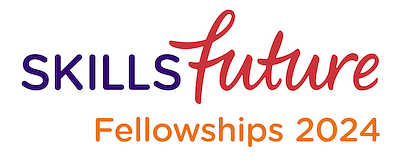BRANDED CONTENT
From air-con technician to company director: How committing to upskilling led to his success
He shares his experience so that others know it’s never too late to learn new skills and hone existing ones

Through his upskilling journey, Mr Roy Ee (second from left) saw the importance of sharing knowledge with his staff. It reinforced his learning while inspiring others to pursue self-development.
PHOTO: WORKFORCE SINGAPORE
Jeremy Theseira, Content STudio
Follow topic:
It was his first full-time job. But barely a month in, Mr Roy Ee was ready to quit.
Mr Ee, aged 22 then, found work as a commercial air-conditioning technician for local integrated facilities management company Keppel FMO. His job was to maintain and service the air-con units of passenger boarding bridges at Changi Airport.
It involved spending long hours under the sun, working at heights of up to six metres. “I found it really tough,” says Mr Ee, 41, who took home a three-figure salary.
“I couldn’t bring myself to climb that high, and return home covered in grease every day.” He was single and living with his parents and three siblings in a four-room Housing Board flat in Tampines then.
Mr Ee felt like his options were limited. With a National Trade Certificate (NTC) 2 qualification from the Institute of Technical Education (ITE), pursuing better options proved challenging. The NTC certification was replaced by the National ITE Certificate, or Nitec, in 2002.
What stopped him from quitting? He believed that leaving a company shortly after joining would reflect badly on him. “Another company may not hire me if I’m seen as a quitter,” says Mr Ee.
In 2014, Keppel FMO was acquired by French energy solutions company Engie through its subsidiary Engie South East Asia (formerly known as GDF Suez and Cofely South East Asia).
As the company evolved over the last 20 years, so did Mr Ee. Today, he is head of integrated facilities management for Engie’s operations in Singapore, earning a six-figure annual income.
What was his turning point? Observing his supervisors, who were technical officers, spend comparatively more time working from the comforts of their office.
He was envious. It made him ask: “Why can’t I be like them? What would it take for me to grow, and transition from spending long hours outdoors to conducting briefings and doing inspections?
“I started to think about how I could turn things around for myself. For me to grow and to excel, I had to further my studies.”
Staying committed to the process
Looking to gain skills that would expand his scope, Mr Ee pursued a Higher Nitec in electrical engineering in 2005 – returning to ITE four years after graduating.
“I couldn’t handle electrical problems back then,” says Mr Ee. “I figured these skills would help me be more self-sufficient, and stay competitive.”
But his pursuit of a better future meant two years of gruelling schedules and unwavering commitment. His five-and-a-half-day work schedule included evening classes four times a week. On Sundays, he helped his 73-year-old father, who ran a stall as a butcher. His mother, 69, is a homemaker.

During the Higher Nitec course, Mr Ee shares that he would leave home at 7am for work, and return at 10.30pm after attending evening classes.
PHOTO: THARM SOOK WAI
“It’s like I worked seven days a week,” says Mr Ee. “I had to sacrifice a lot of my personal time.”
It was worth it. Mr Ee was promoted to a supervisory position just seven months into the Higher Nitec course. How? By actively applying the knowledge he learnt to his work, complementing his technical skills.
“I try to relate everything I’m learning to what I’m doing. It helps me learn better while improving my capabilities,” says Mr Ee, who graduated with a grade point average of 3.7 out of 4.
The experience also changed his mindset and attitude towards learning. This was in stark contrast to his younger days, says Mr Ee, who disliked school and was once even expelled for bad behaviour.
He went on to pursue a diploma in electrical and electronic engineering in 2007 from Singapore Polytechnic, and a bachelor’s in facilities and event management in 2011 from the Singapore University of Social Sciences (SUSS).
His upskilling efforts were recognised by the company. Mr Ee was promoted with each qualification he attained, and eventually placed on a management track. It also reimbursed his university fees.
This, he shares, was a welcome surprise at an important stage of his life – the birth of his first child in 2011.
“We only found out that my wife was expecting after I had enrolled at SUSS,” says Mr Ee, who wanted to postpone his studies upon hearing the news.
He was concerned about the money needed to raise a child and pay for university tuition fees. “I didn’t want to burden my wife, who had supported me all these years.” Mr Ee first met his wife, 38, in 1999. They married in 2009, and have two sons, aged seven and 13.
Even with the financial burden lifted, Mr Ee shares that support from the family was just as important in his personal development. “They were a key source of my motivation and perseverance.”
The will to upskill
- From crippling self-doubt to upskilling clout: In his journey to learn more about himself, this ex-commando discovered a passion for psychology and skills upgrading.
- She’s a super reskiller: This supply chain professional’s unwavering desire to learn and passion for mentoring others keeps her going.
Passing it on
As important as it was for Mr Ee to upskill, he also believed in the value of sharing his newfound knowledge with the 500 staff he now leads.
For example, he shares: “At my morning briefings to the team, I always try to teach and impart what I’ve learnt to them. It helped me to better remember what I learnt, instead of just memorising.
“They were really interested, and also wanted to learn. The more they know, the easier it becomes for all of us to carry out our roles and responsibilities.”
Mr David Chau, 36, director of integrated facilities management at Engie, is one who has gained from Mr Ee’s efforts to foster a culture of continuous learning.
“Roy has always been a motivational and inspirational figure within the company,” says Mr Chau, who reports to Mr Ee. They were also course mates at SUSS.
Encouraged by Mr Ee, he pursued safety and sustainability-related courses and certifications to bolster his industry knowledge.
While some may still be reluctant to attend training, Mr Chau observes that this has “greatly reduced over time”. He says: “More are putting up requests to attend courses that could help in their work.”
In addition to changing mindsets, receiving the SkillsFuture Fellowship last October from President Tharman Shanmugaratnam was perhaps Mr Ee’s greatest achievement to date, he says. It represented the culmination of his decade-long journey of self-improvement through continuous learning.
“Only my family and colleagues knew my story, and I wanted to share my journey as a way of inspiring others,” he says.
His advice is for others to avoid “going through the same pain” and to “focus on what you’re doing now, to succeed in the future”.
“If you don’t do well at first, it is not the end. You can continue to go further, regardless of the stage you are at. This journey is tough, but it's achievable.”
A mark of honour
The SkillsFuture Fellowships recognise individuals as masters of skills and mentors of future talent.
Presented by the President, recipients also receive a monetary award of $10,000 to continue their pursuit of skills mastery.
Applications are open to Singapore citizens with at least 10 years of work experience in the same, or related, industry or job function.
Recipients of the SkillsFuture Fellowships possess deep skills in relevant areas of professional and technical expertise, demonstrate a strong personal commitment to lifelong learning and mastery of domain, and contribute significantly to the skills development of others.
- The SkillsFuture Fellowships and SkillsFuture Employer Awards 2024 are now open for application until March 20.
This is the first of a two-part series produced in partnership with SkillsFuture Singapore


